Track incline.
Track incline.
I am planning an incline on my new layout, and I have a question for you learned folk.
I have a 3d printer and am considering printing the incline supports. The height of these will be compatible to a layout plan I have seen which will give me an incline of about 3%. The supports will be positioned at regular intervals along the track.
My question is. Is it advisable to have a "base board" between the supports and if so what thickness?
Hope you can help.
John
PS. Glad the Forum is back!!!
I have a 3d printer and am considering printing the incline supports. The height of these will be compatible to a layout plan I have seen which will give me an incline of about 3%. The supports will be positioned at regular intervals along the track.
My question is. Is it advisable to have a "base board" between the supports and if so what thickness?
Hope you can help.
John
PS. Glad the Forum is back!!!
Re: Track incline.
Well track and sleepers hanging in the air won’t look right and yes the track will sag, particularly with a loco on it.
My preference for raised track is 9mm ply but with additional support you can get away with thinner material.
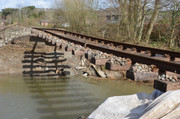
My preference for raised track is 9mm ply but with additional support you can get away with thinner material.

"Not very stable, but incredibly versatile." 
- teedoubleudee
- Posts: 1116
- Joined: Fri Oct 05, 2018 2:53 pm
- Location: Downham Market
- Contact:
Re: Track incline.
I've used 6mm ply on supports about six inches apart. No support base just wouldn't look right IMO
Most people are shocked when they find out how bad I am as an electrician
Re: Track incline.
I had an incline going up and also going down where tracks ran down against the left hand wall into a tunnel and under the layout into a loop then back out the same tunnel, it ran level around the wall then down onto the layout. All are made of ply on blocks.of wood at graduating heights. The rise and decent on both gradients ran for the length of two walls on top and below so the trains never struggled with the climb at all. The track was one single line where you could start a train and it would run on every line in every direction and return to where it started.
Puddles
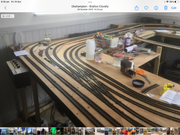
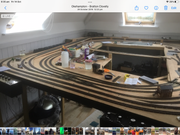
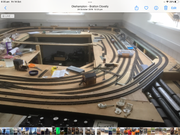
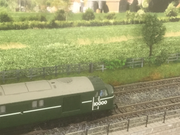
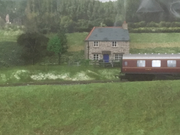
Puddles





It does not take me long to do five minutes work.
Nostalgia is not what it used to be.
Nostalgia is not what it used to be.
Re: Track incline.
Wonderful photos, those. Particularly the gray rock nudging through the swale. I am going to do my best to plagiarize some of this upon Henley.
Going to avoid inclines, NTL, as my beloved High Wheelers, aka single drive wheel, will not tolerate even the slightest of gradients.
Going to avoid inclines, NTL, as my beloved High Wheelers, aka single drive wheel, will not tolerate even the slightest of gradients.
Re: Track incline.
I used 9mm ply, 2 reasons, easy to pin track down and easy to ballast the tracks after laying track. If you use rail supports there is nothing under the tracks for any other purpose. You can fit as many supports as you like or is necessary.. In the picture below shows mine in construction waiting for more supports to be fitted under. My supports were made from any timber left over from the base board frames.
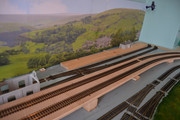

Sandy
Re: Track incline.
I to would recommend a solid base for the incline 6 or 9mm ply being the norm. Supported on riser blocks of increasing height as the incline progresses, I wouldn't recommend spacing the risers any further apart than 12" inches (300mm) and better if they are closer together.
Also remember that in OO/HO a rise of 1 in 30 is about the maximum incline and shallower and longer is better.
Note: 1 in 30 is for every 1 unit of rise 30 identical units are used in length. e.g. 1" inch rise needs 30" inches of length or 1 Cm rise needs 30 Cm of length, these are Maximum incline recommended and ideally use shallower / longer e.g. 1 in 40 or greater. Also where a curve is involved in the rise shallower than 1 in 30 is probably needed, as the curve adds drag to the loco pulling its load up the slope.
Also remember that in OO/HO a rise of 1 in 30 is about the maximum incline and shallower and longer is better.
Note: 1 in 30 is for every 1 unit of rise 30 identical units are used in length. e.g. 1" inch rise needs 30" inches of length or 1 Cm rise needs 30 Cm of length, these are Maximum incline recommended and ideally use shallower / longer e.g. 1 in 40 or greater. Also where a curve is involved in the rise shallower than 1 in 30 is probably needed, as the curve adds drag to the loco pulling its load up the slope.
Re: Track incline.
Have you considered the Woodland Scenic incline sets?
Woodland Scenic Incline
Woodland Scenic Incline
And the Lord said unto John “Come forth and receive eternal life”, but John came fifth and won a toaster!
Re: Track incline.
Thank you for your suggestion, Mr Bones. I like the challenge of designing, drawing and printing my own supports.
I will take your thoughts, Brian, regarding support distance. I was planning on intervals of 150mm (6" in old money), which has been suggested earlier, using 6mm ply for the "baseboard"
Thing may not work out, but I will give it a try as the nights are drawing in and cannot get out and about.
John
I will take your thoughts, Brian, regarding support distance. I was planning on intervals of 150mm (6" in old money), which has been suggested earlier, using 6mm ply for the "baseboard"
Thing may not work out, but I will give it a try as the nights are drawing in and cannot get out and about.
John
Re: Track incline.
I hate poly plastic track risers. They are very hard to fix the track to permanently. They don't accept track pins for long. and try ballasting them. I think they are very expensive as well. Whats wrong with the same material you make the Base boards from. After all the incline is just an extension of the base boards. And that is the way it has always been done and very successfully as well.
Sandy
Who is online
Users browsing this forum: No registered users and 2 guests
